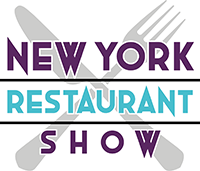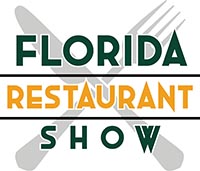Foodservice businesses are finding more sustainable ways to deliver the goods
By Sara Perez Webber
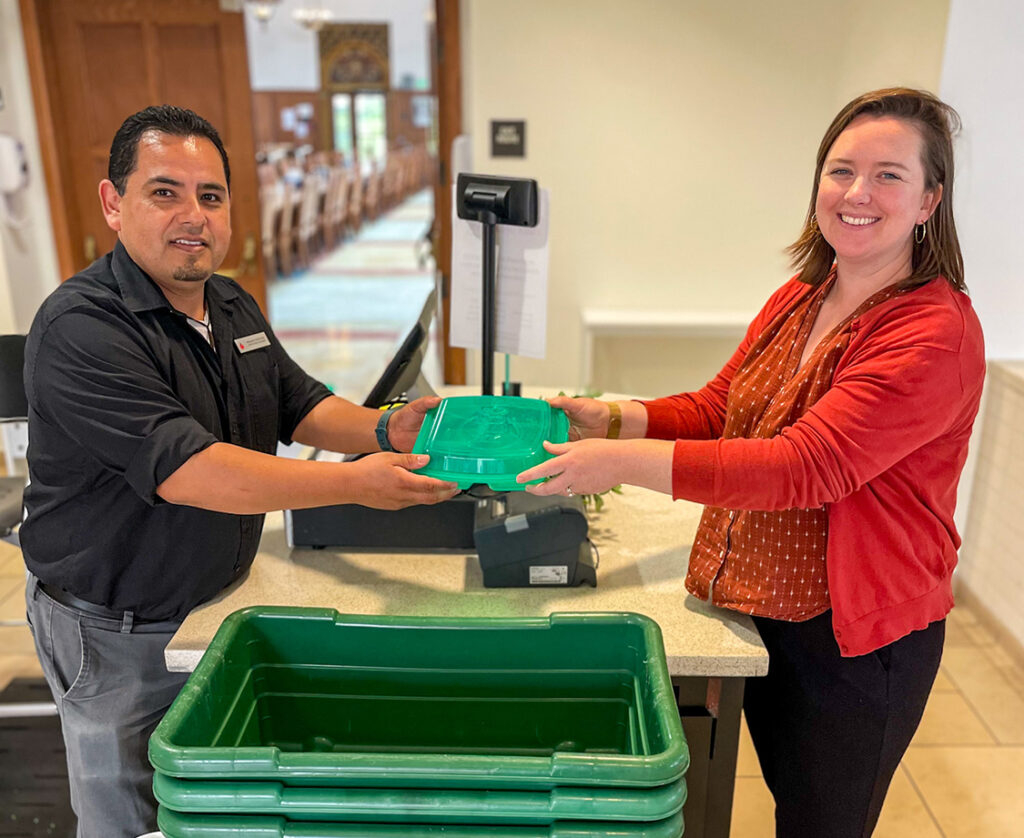
For foodservice companies committed to sustainability, packaging presents an ongoing challenge. After all, your food needs to get into the hands of customers. But how do you do it in a way that minimizes waste?
Steve Short, COO and chief culinary officer of Steve Short Culinary Team (SSCT) in Phoenix, has been focusing on such solutions for years. “We are convinced that if you are in the food and hospitality business, you have an obligation to handle your waste and your food from start to finish,” says Short.
In fact, Short believes so strongly in sustainability that he transformed his business—Atlasta Catering, Arizona’s second-largest catering company—into a zero-waste company nearly a decade ago. He and his wife, CEO Kristine Short, recently launched Steve Short Culinary Team as the new parent company for Atlasta and five other divisions the company has added since its founding in 1979. One division, Clear Stock Consulting, advises other hospitality companies nationwide on how to implement sustainable systems.
The full-service catering line, Atlasta, will be fully transitioned to zero single-use products by September. How SSCT and other foodservice businesses are approaching packaging for drop-off catering and food shipments proves that the quest for sustainability is driving innovation and thoughtful strategies to influence guest behavior.
Sustainability Pickup
For its Casual Catering line, which delivers chef-crafted and ready-to-serve food, SSCT now sends out all orders in compostable and bamboo packaging. In addition to shifting away from single-use plastics, the company offers clients the option of a sustainability pickup at no extra charge.
If a customer requests a sustainability pickup, a Casual Catering crew will return to the delivery site and pick up all the containers and leftover food, leaving behind smaller bamboo containers if the customer wants to keep any of the remaining food. After returning to the SSCT facility, crew members then clean the containers, separating the items for recycling and composting pickup. Food scraps are donated to local farms for animal feed or compost. Separately, for its full-service catering events when food is under constant refrigeration, SSCT donates 50,000 to 60,000 pounds of untouched food annually to Waste Not, an Arizona nonprofit that delivers food to agencies serving people in need.
Reusable To-Go Containers
At Saint Mary’s College of California, the Good Eating Company—which provides chef-driven food services for more than 60 corporate and academic sites in the U.S.—is using Topanga technology to encourage customers to return their to-go containers so they don’t end up in a landfill. After students and faculty sign up for the program, their personal QR code is scanned along with the reusable container when they purchase food to go, creating a connection between the individual and the specific container. Participants receive a reminder text about the due date for returning the container, which is then rewashed and can be used hundreds more times. The program has seen a consistent 96% return rate, and in just one semester, 1,344 containers were kept from the landfill.
According to Claire Turner, Good Eating’s director of sustainability, the tech-enabled solution will be rolled out to all the company’s university sites. In addition, Good Eating trains team members to ask guests if they would like a mug “for here” instead of asking for it “to go.” Says Turner: “We apply the same principle for our cafés. Immediately following the pandemic, we saw such an increase in requests for disposables. That behavior has stuck around to the point that we now see guests eating their ‘to-go’ dishes in the café. To offset this trend, we train our team to offer our guests plates first.”
Recyclable and Reusable
The Catering Crate, a hotel-pan-size disposable carrier for drop-off catering, is made of cardboard, so it’s recyclable. Another benefit customers appreciate is its reusability. Printed with a pleasing design on white or kraft cardboard, the Catering Crate provides an attractive way to display a drop-off display—giving it a dual purpose—and its durability means it can be used multiple times.
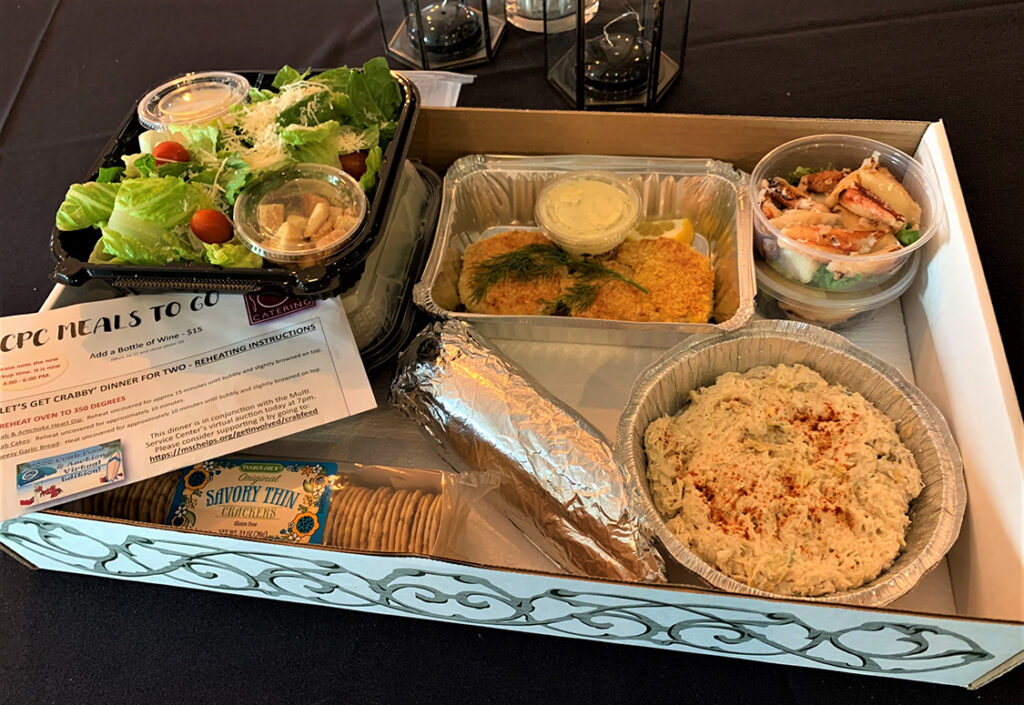
Owners Amy and John Hatcher developed Catering Crate to fill a need at their own successful catering company in the Seattle area. It’s made of heavy-gauge cardboard with insulating pads, so food stays hot or cold for three-plus hours—no fuel source necessary. Thanks to its affordability, the Catering Crate can be left at the delivery location. According to Amy, Catering Crates are typically used for events ranging from 20 to hundreds of guests, and can also be used for single-family meal carryout. “Many of our customers pack a single half or full-size Catering Crate with smaller containers of food to serve a meal for two to six,” she says. Cardboard insulating pads are available that are easily recyclable.
Closed-Loop Recycling
Many foodservice manufacturers are also taking measures to ensure their packaging is eco-friendly. For example, Boston-based North Coast Seafoods, a leading supplier of sustainably sourced seafood, has introduced 100% recyclable and reusable packaging made by Australia-based Disruptive Packaging. The new packaging utilizes UNICOR, composed of up to 70% calcium carbonate and 20%-30% HDPE (high-density polyethylene). Its properties make the packaging 100% closed-loop recyclable, which means the material can be recycled indefinitely without losing its quality.
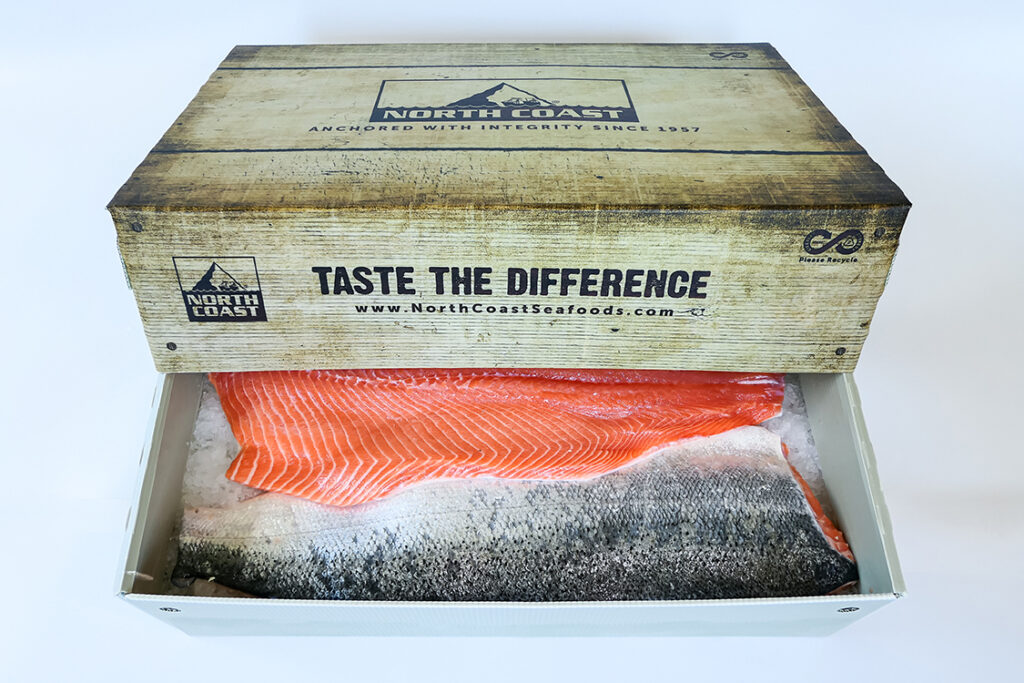
“This is a continuous loop where products are used and then brought back into the system through recycling or reusing,” explains Christian L’Heureux, marketing manager for North Coast Seafoods. “UNICOR boxes can be broken down and used to create more boxes indefinitely.” The new boxes’ design pays homage to the wood fish boxes used by North Coast in its early days. In addition, notes L’Heureux, “customers will notice that the boxes are sturdy, leak-proof and provide excellent insulation and temperature control. The UNICOR boxes also take up less space in coolers/freezers, do not chip or flake, and are easier to break down, making for effortless recycling.”
For More Information
Catering Crate cateringcrate.com
Good Eating Company goodeatingcompanyus.com
North Coast Seafoods northcoastseafoods.com
Steve Short Culinary Team steveshortculinaryteam.com





